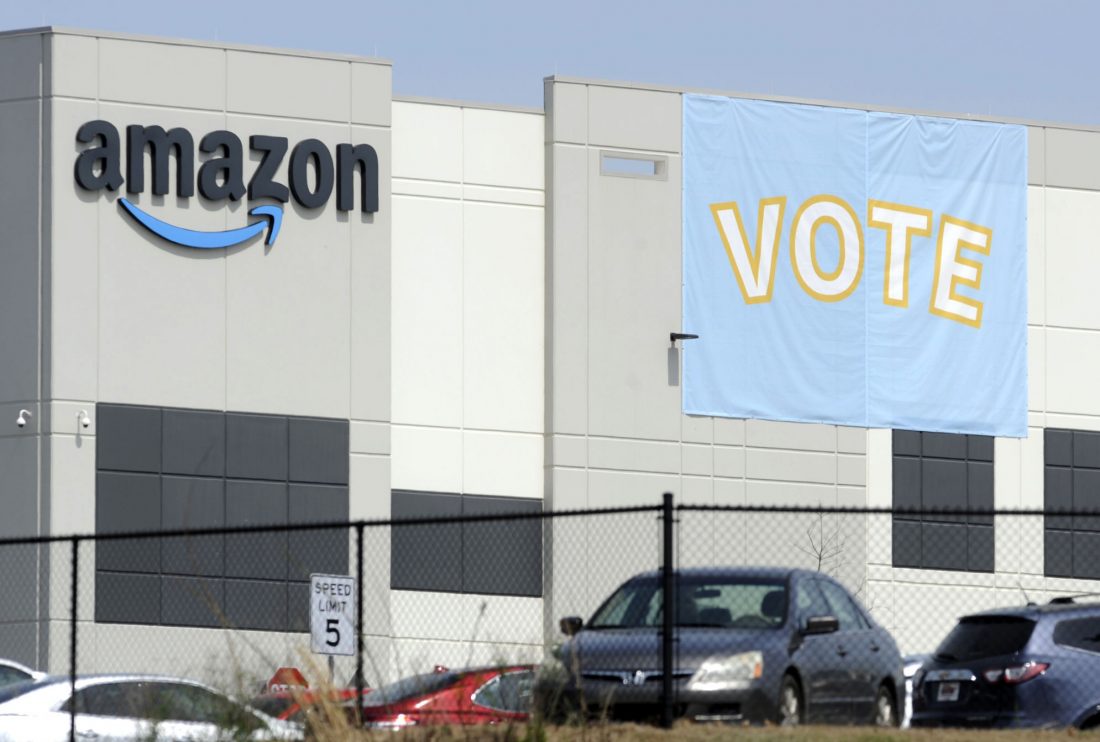Workers don’t share Democrats’ nostalgia for Unions

AP photo In this March 30 file photo, a banner encouraging workers to vote in labor balloting is shown at an Amazon warehouse in Bessemer, Ala.
It wasn’t even close. The final count was 1,798 against and 738 for, 71 percent to 29 percent.
The issue in question was whether the employees at an Amazon warehouse in Bessemer, Alabama, wanted to be represented by the Retail, Wholesale and Department Store Union. Not, as The Washington Post, owned by Amazon CEO Jeff Bezos, put it: a contest of “Big Tech vs. its workers.”
The workers weren’t one of the adversaries; they were the judges, and 71 percent of them decided — contrary to media coverage and despite nudges from President Joe Biden — not to choose the union.
That has significance far beyond the individuals involved. Amazon is now America’s second-largest employer, after Walmart, with more than 950,000 domestic employees. With the increased demand for delivered merchandise during COVID-19 restrictions, Amazon reports that it has hired some 427,300 workers over the past year.
It’s no secret that organized labor unions would like to represent employees at firms like Walmart and Amazon. That would bring in millions in union dues and, in the opinion of union advocates, better wages, benefits and working conditions for workers.
It’s more of a secret that Democratic politicians want unions to organize these firms. Perhaps they think it would help workers, but another reason is that unions channel large amounts in campaign contributions, almost every single dollar to Democrats. Unionization is — though liberals don’t like to hear this — a form of public financing of campaigns for one political party.
The retail workers union and other unions haven’t tried nationwide drives at Amazon or Walmart. That would require a hugely expensive national organizing campaign, with low chances of success. The Bessemer warehouse, with its majority-black workforce in a majority-black county, looked like a more feasible target. In partisan elections, they undoubtedly vote heavily Democratic.
That was also true of Nissan’s auto assembly plant in Canton, Mississippi, whose majority-black workforce the United Auto Workers attempted to organize in 2016 and 2017. But in August 2017, 63 percent of the 3,500 workers voting rejected union representation. Like the Amazon workers in Bessemer, they were evidently satisfied with current wages and benefits and felt that union dues wouldn’t be worth paying.
Since the Nissan vote, two national UAW presidents have been convicted of embezzling union funds. That’s not going to make it easier for the UAW to snap its losing streak of never organizing non-U.S.-based auto plants. And it’s a sad contrast with the austere integrity of longtime (1946-1968) UAW President Walter Reuther and his immediate successors.
Many liberal commentators look back to Reuther’s time and the “midcentury moment” when private-sector unionism peaked in the United States, at 35 percent of the private sector workforce in 1954. The most recent figure is 6 percent. Public employees, almost none of them unionized in the 1950s, now make up about half of all union members.
The surge in private-sector union membership came in the late 1930s, when the UAW and other unions organized auto, steel, rubber and other heavy industries. Unions staged sit-down strikes — illegally occupying huge factories — and Michigan’s Democratic governor refused to order troops to enforce court orders. The companies recognized the UAW, but the governor was defeated in 1938.
The Biden Democrats’ major legislation is interlarded with provisions they hope will promote unionization. They want to sign up subsidized home care workers and preschool attendants into unions, as some Democratic states have, and to classify gig workers (like Uber drivers) as full-time employees, with minimum hours, weekly schedules and mandatory union dues, as California tried to. They want to repeal 27 states’ right-to-work laws.
Some of these may work, at least temporarily, and channel millions of tax dollars to Democratic campaigns. But they’re not likely to recreate the 1930s era of explosive union growth or midcentury moment of contented union membership.
——
Michael Barone is a senior political analyst
for the Washington Examiner.


